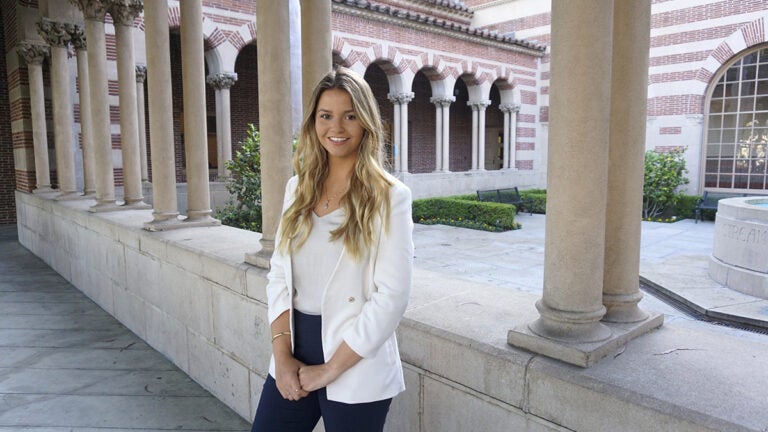
Student gains different perspectives on the political process through two D.C.–based internships
When Kelley Xuereb got her first smart phone in middle school, her easy access to climate change news made her go from being simply an outdoors enthusiast to an environmental and human rights advocate.
“I grew up in the Bay Area and have always had a very deep connection with the outdoor world. When I got my phone I read the news and became interested in issues of climate and human rights injustice, and since then I’ve been trying to narrow in on how I can use the resources and privileges that I have to mobilize change around what I believe are injustices in the world,” Xuereb said.
It was that desire to effect change that led Xuereb to pursue a major in international relations (global business) with a minor in environmental studies at the USC Dornsife College of Letters, Arts and Sciences. She took a class with Jeffrey Fields, associate professor of the practice of international relations and director of USC Dornsife’s Washington, D.C., Program, and he encouraged her to apply for the program. Her internship in spring 2020 was in the office of House Speaker Nancy Pelosi; that summer she completed another internship, this time for the Environmental Protection Agency (EPA).
In the office of the speaker
As someone who grew up in a suburb of San Francisco, Xuereb had followed Pelosi’s career and admired her skillful use of the levers of government. As an intern in the speaker’s office, Xuereb’s duties encompassed nearly every step of the legislative process. She tracked all of the legislation for several House committees. She researched the legislation to be reviewed by the House before it was turned over to the Senate, went to hearings of relevant subcommittees, wrote memoranda on the bills introduced and created voting recommendations.
One especially memorable part of the internship involved her work with a provision in a 2015 bill that pertained to Apache tribal land, including miles of sacred land, being sold to a mining company, an exchange set to happen in November 2020. Xuereb met with leaders and activists who wanted to stop the mining, gathered quantitative data on the bill’s impact on natural resources and wrote up a memorandum on the issue.
“After I started working on the issue, I saw the memorandum I wrote and information I researched being used to inform policy decisions within the office, all the way to a subcommittee hearing. The ability to meaningfully contribute to such an urgent and important issue was extremely rewarding, and a reminder of how much work there is to do out there,” she said.
Then the COVID-19 pandemic hit, and Xuereb had to return home. Although the internship continued online through the spring, the disruption caused by the pandemic meant there was little work to do. But that didn’t stop her from taking advantage of political internships.

Xuereb said her “deep connection with the outdoor world” led her to seek out internships with an environmental focus.
Online at the EPA
Xuereb shifted gears and took a position as a physical/life science and engineering intern for the EPA – a position she will continue to hold, part time, through the rest of the school year – in the division of air and radiation. Working online, most of her time is spent reading and analyzing technical documents and evaluating data, and then translating that information in a way that is accessible to the public. She also is working on creating a website for public awareness about COVID-19 during wildfire season.
“I feel excited to be creating something tangible, an accessible resource that has the potential to raise awareness and hopefully even improve public health,” she said.
The internship also gives her insight into the differences between the legislative and executive branches, in atmosphere as well as function.
“Working on environmental issues under Speaker Pelosi, there was an office-wide interest to create more progressive legislation on issues pertaining to renewable energy, environmental justice, etc. Working for the EPA has felt much more pragmatic, as our role is to objectively enforce existing legislation. There is a cardinal belief in the EPA’s role of using executive powers and science to protect public health, and this belief is prioritized over personal political ideologies,” she said.
As far as the future goes, Xuereb has accepted a job with the EPA after graduation; she’s unsure what her long-term career path will be, but it might include law school, a job at the Natural Resources Defense Council and further public-sector work. She credits USC Dornsife for allowing her to explore multiple avenues to find one that suits her.
“I’m not just saying this, I truly think being in a school that is so diverse has allowed me so much flexibility to explore what I wanted to do,” she said. I knew I wanted to work in an international capacity but I’ve been bouncing around from human rights to political science to environmental science. I’ve had a lot of room for exploration, which I’m really grateful for.”